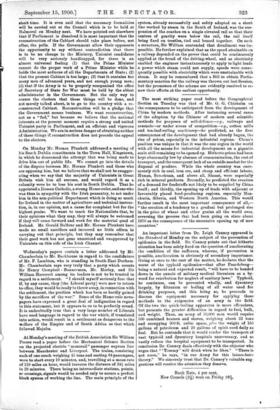An important letter from Dr. Leigh Canney appeared in the
Standard of Monday on the subject of the prevention of epidemics in the field. Dr. Canney points out that hitherto attention has been solely fixed on the question of ameliorating the condition of the sufferers, whereas, if prevention is possible, amelioration is obviously of secondary importance. Going at once to the root of the matter, he declares that the worst of the typhoid epidemics—that after Paardeberg- being a natural and expected result, "will have to be handed down in the annals of military medical literature as a by- word for retribution for neglect of sanitary laws." Typhoid, he continues, can be prevented wholly, and dysentery largely, by filtration or boiling of all water used for drinking purposes, and this being so, he proceeds to discuss the equipment necessary for applying these methods to the exigencies of an army in the field. Of the two the quick-boiling apparatus is more efficacious, but presents the greater difficulties in regard to fuel, bulk, and weight. Thus, an army of 50,000 men would require 500 combined heaters and stoves, weighing about 22 tons and occupying 300 ft. cubic space, plus the weight of 150 gallons of petroleum and 20 gallons of spirit used daily as fuel. But he contends that it would render the transport of vast typhoid and dysentery hospitals unnecessary, and so vastly reduce the hospital equipment to be transported. In conclusion Dr. Canney deals effectively with the objector who urges that " ' Tommy ' will drink when he likes." "There is not room," be says, "in our Army for this laissez-boire theory." We sincerely trust that Dr. Canney's valuable sug- gestions will receive the attention they deserve.






































 Previous page
Previous page